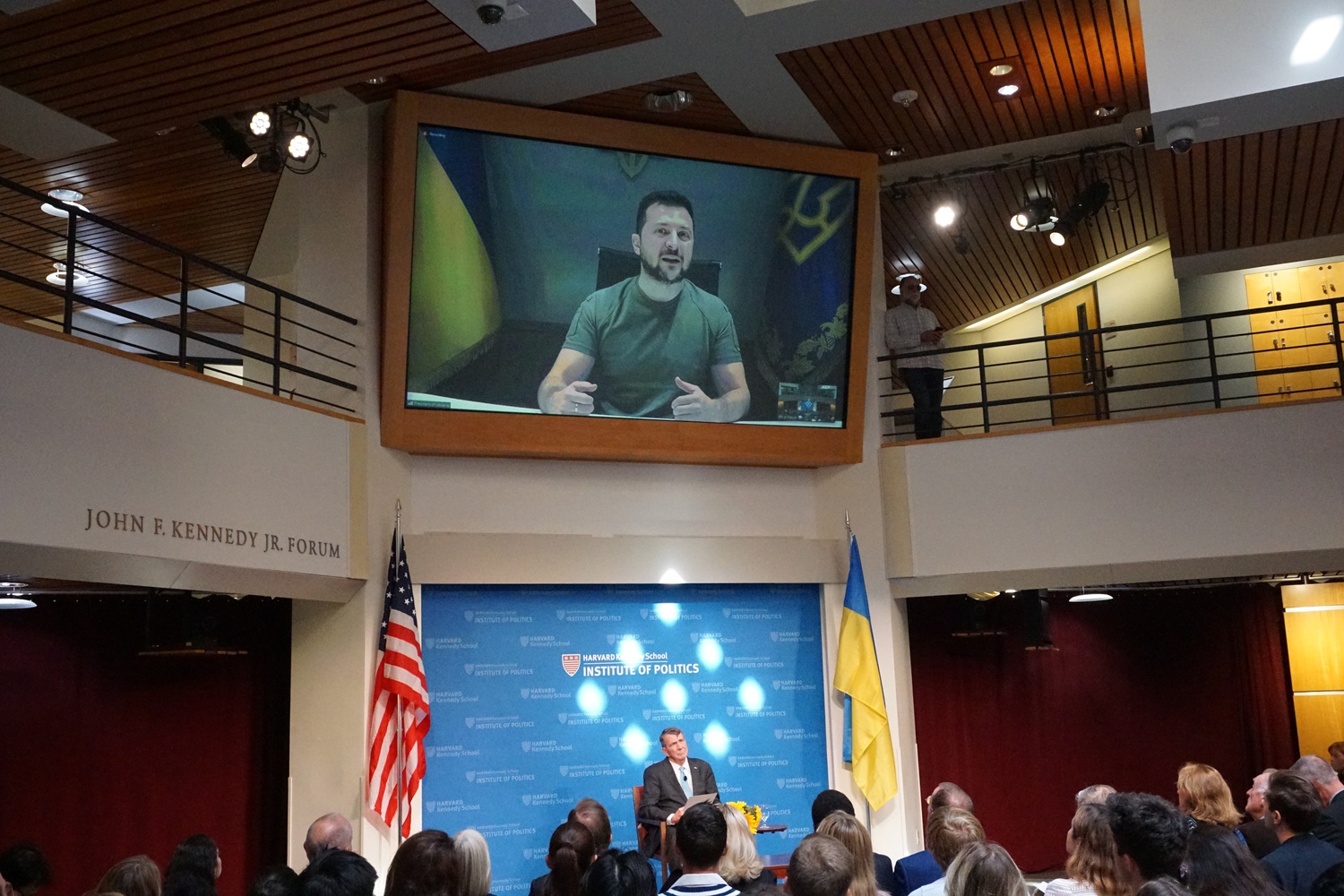
News
Harvard Grad Union Agrees To Bargain Without Ground Rules

News
Harvard Chabad Petitions to Change City Zoning Laws

News
Kestenbaum Files Opposition to Harvard’s Request for Documents

News
Harvard Agrees to a 1-Year $6 Million PILOT Agreement With the City of Cambridge

News
HUA Election Will Feature No Referenda or Survey Questions
Ukrainian President Zelensky Accuses Russia of Trying to Draft Ukrainians into Military at Harvard IOP Forum

Ukrainian President Volodymyr Zelensky accused the Russian government of staging a set of referendums in an effort to draft thousands of Ukrainians into the Russian military while speaking at a Harvard Institute of Politics forum on Tuesday.
Speaking via Zoom to a packed IOP crowd, Zelensky said Russia will soon announce its annexation of Luhansk, Donetsk, Kherson and Zaporizhzhia — the four partially occupied Ukrainian regions where voting ended on Tuesday in the staged referendums.
Russian state media reported that over 96 percent of voters in each referendum supported joining the Russian Federation — but Zelesnky and other Western governments have called the elections a “sham.”
Zelensky said the “so-called” referendums and Russian President Vladimir Putin’s partial mobilization of the Russian military last week represented a calculated effort by the Russian government to use Ukrainians to fight its war against Ukraine.
“They did it in preparation of annexation, with a clear aim to also muster and call up residents at those occupied territories — to force hundreds of thousands of Ukrainians of the occupied territories to be enlisted in their army,” Zelensky said through a translator.
Zelensky, who appeared in one of his trademark military-green T-shirts, was greeted with a 30-second standing ovation and a flurry of laudatory questions from audience members at the IOP.
Zelensky urged members of the crowd to take Russia seriously in its threats to use nuclear weapons.
“Even at the level of rhetoric, this already amounts to a crime,” Zelensky said. “Nuclear blackmail, annexation threats — the mere statements already earn some rigid action in response to prevent any such catastrophic scenario.”
Zelensky also discussed how the war has forced Ukrainians of all ages to become leaders.
“We’ve become leaders in war,” Zelensky said. “We were compelled to become those in our sheer attempt to withstand the evil.”
“Meanwhile, we have many Ukrainians who are demonstrating the newly discovered leadership skills every day on the front line,” he added. “We have kids collecting donations for the front line, we have kids who even simply bring water to our servicemen at checkpoints, we have wonderful health care professionals, we have nurses doing the utmost to help those wounded and maimed in the war.”
In response to a question from a Ukrainian student about how people studying abroad can use their knowledge to help rebuild Ukraine after the war, Zelensky said that the “key resource” of any nation is its people.
Ukraine will need to rebuild its infrastructure and revive its universities and other intellectual institutions, Zelesnky said.
“Given the amount of damage inflicted by Russian troops, I think there will be time and place for you, with your head, with your brains, with your education,” Zelensky said.
In an interview after the event, former Harvard Kennedy School Dean Graham T. Allison ’62 argued that Western universities should be opening their doors to educate and train Ukrainian and Russian students alike.
Zelensky has previously called on Western countries to ban all Russian citizens from crossing their borders — regardless of whether they support Putin.
Allison, who sat in the front row during the forum, said Zelensky’s call for a blanket ban on Russian citizens is “not sensible.”
“I’ve argued, to the contrary, that the U.S. should be recruiting super-talents out of Russia to demonstrate, as [Zelensky] said today, that ultimately, a country is the talent of its people,” Allison said.
“If the most talented people get up with their feet and walk out of a country that’s led by a leader they don’t respect, into a blind alley that they don’t want to go into, that country will be weaker in the long run,” he added.
—Staff writer Miles J. Herszenhorn can be reached at miles.herszenhorn@thecrimson.com. Follow him on Twitter @MHerszenhorn.
Want to keep up with breaking news? Subscribe to our email newsletter.
